how to find the x intercepts of an equation
How to Find the X-Intercepts and Y-Intercepts
The X-Intercepts
The x-intercepts are points where the graph of a function or an equation crosses or "touches" the x-axis of the Cartesian Plane. You may think of this as a point with y-value of zero.
- To find the x-intercepts of an equation, let y = 0 then solve for x.
- In a point notation, it is written as \left( {x,0} \right).
x-intercept of a Linear Function or a Straight Line
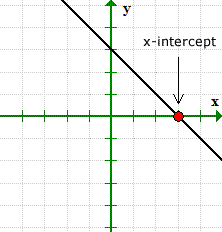
x-intercepts of a Quadratic Function or Parabola
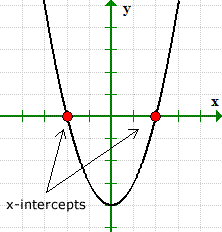
The Y-Intercepts
The y-intercepts are points where the graph of a function or an equation crosses or "touches" the y-axis of the Cartesian Plane. You may think of this as a point with x-value of zero.
- To find the y-intercepts of an equation, let x = 0 then solve for y.
- In a point notation, it is written as \left( {0,y} \right).
y-intercept of a Linear Function or a Straight Line
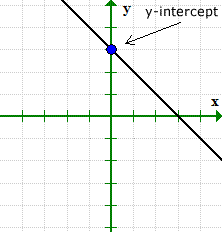
y-intercept of a Quadratic Function or Parabola
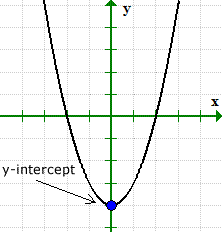
Examples of How to Find the x and y-intercepts of a Line, Parabola, and Circle
Example 1: From the graph, describe the x and y-intercepts using point notation.

The graph crosses the x-axis at x= 1 and x= 3, therefore, we can write the x-intercepts as points (1,0) and (–3, 0).
Similarly, the graph crosses the y-axis at y=3. Its y-intercept can be written as the point (0,3).
Example 2: Find the x and y-intercepts of the line y = –2 x + 4 .
To find the x-intercepts algebraically, we let y=0 in the equation and then solve for values of x. In the same manner, to find for y-intercepts algebraically, we let x=0 in the equation and then solve for y.

Here's the graph to verify that our answers are correct.
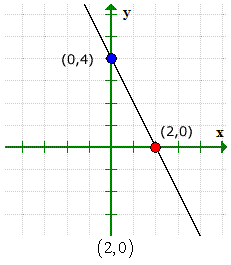
Example 3: Find the x and y-intercepts of the quadratic equation y = x 2 − 2 x − 3 .
The graph of this quadratic equation is a parabola. We expect it to have a "U" shape where it would either open up or down.
To solve for the x-intercept of this problem, you will factor a simple trinomial. Then you set each binomial factor equal to zero and solve for x.

Our solved values for both x and y-intercepts match with the graphical solution.
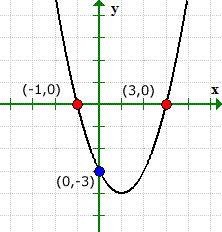
Example 4: Find the x and y-intercepts of the quadratic equation y = 3 x 2 + 1.
This is an example where the graph of the equation has a y-intercept but without an x-intercept.
- Let's find the y-intercept first because it's extremely easy! Plug in x = 0 then solve for y.

- Now for the x-intercept. Plug in y = 0, and solve for x.
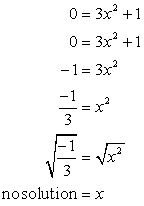
The square root of a negative number is imaginary. This suggests that this equation does not have an x-intercept!
The graph can verify what's going on. Notice that the graph crossed the y-axis at (0,1), but never did with the x-axis.
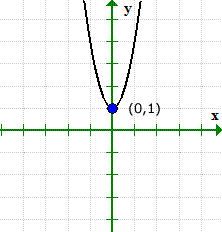
Example 5: Find the x and y intercepts of the circle ( x + 4)2 + ( y + 2)2 = 8 .
This is a good example to illustrate that it is possible for the graph of an equation to have x-intercepts but without y-intercepts.

When solving for y, we arrived at the situation of trying to get the square root of a negative number. The answer is imaginary, thus, no solution. That means the equation doesn't have any y-intercepts.
The graph verifies that we are right for the values of our x-intercepts, and it has no y-intercepts.
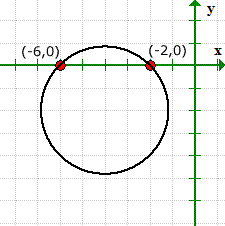
how to find the x intercepts of an equation
Source: https://www.chilimath.com/lessons/intermediate-algebra/finding-x-y-intercepts/
Posted by: norsworthyfamembady.blogspot.com

0 Response to "how to find the x intercepts of an equation"
Post a Comment